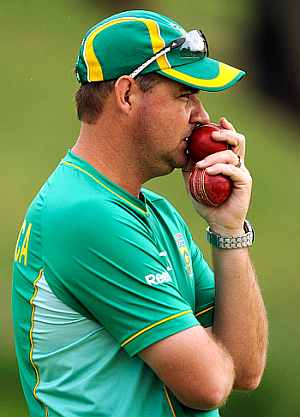 | « Back to article | Print this article |
Former South Africa coach Mickey Arthur has made a shock revelation that they suspected match-fixing when Pakistan lost a One-dayer against them in Lahore in 2007.
Arthur went public with his revelation when Pakistan and South Africa have just started a One-day series in Abu Dhabi.
Arthur's revelation can be found in his soon-to-be released biography Taking The Mickey but he spoke about it in an interview with South African website Sport24.
Talking about the 2007 series, which they won 3-2, Arthur said they suspected match-fixing when Pakistan lost decisive ODI from an advantageous position.
 "There was a strong suspicion of match-fixing and it took some of the gloss off the series win," Arthur told Sport24.
"There was a strong suspicion of match-fixing and it took some of the gloss off the series win," Arthur told Sport24.
"We did not have any proof, but when you have been involved in the game long enough, you know when something is not right. How else do you explain a batting side needing only 40 runs with 7 wickets in hand, and then losing?," he added.
Chasing 234 to win, Pakistan were positioned comfortably at 149 for two but went on to lose the match and the series.
Arthur's comments have come at a time when three Pakistani cricketers have been suspended by International Cricket Council (ICC) on spot-fixing allegations.
Salman Butt, Mohammad Asif and Mohammad Amir were suspended after a British tabloid claimed that they took bribes to bowl deliberately no-balls in the Lord's Test.
Arthur also predicted easy win for South Africa in the five-match one-day series against Pakistan.
"Pakistan are at an absolute low and I can't see us having any trouble beating them. Our real test will come when we play against India at home at the end of the year," Arthur, who is now coach of Western Australia, said.